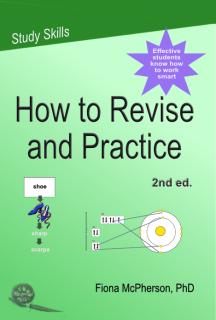In this revised edition of How to Learn: The 10 principles of effective revision & practice, examples and exercises from science, mathematics, history, foreign languages, and skill learning, are used to show exactly how to apply the 10 principles of effective practice and revision.
Few students know how to revise effectively, which is why they waste so much time going over and over material, as they try to hammer it into their heads. But you don’t need to spend all that time, and you don’t need to endure such boredom. What you need to do is understand how to review your learning in the most effective way. Using examples and exercises from science, math, history, foreign languages, and skill learning, that is what this book aims to teach you. This workbook will tell you
- what you should practice or revise
- how you should revise
- how often you should revise
- how far apart you should schedule your sessions
- different strategies you can use in your practice / revision
- how skill learning differs from ‘fact’ learning
and more.
This workbook is for students who are serious about being successful in study, and teachers who want to know how best to help their students learn.
Publication date: November, 2020
File size: 14 MB / 296 pages
ISBN: 978-1-927166-64-2
1. What you need to know about memory
The 8 basic principles of memory
How neurons work
Working memory — a constraining factor
The role of consolidation in memory
Points to remember
Review questions
2. What should you practice?
Some examples
Points to remember
Part I: Principles of retrieval practice
3. Retrieval practice
Keyword mnemonic
Concept maps
Mnemonics & concept mapping can support retrieval practice
Benefits for related information
Errorless learning
Forced guessing
Points to remember
Review questions
4. How often should you practice?
Criterion levels set the number of correct retrievals
Task difficulty affects optimal criterion level
Individual items may demand different criterion levels
Individual differences matter
How many times should you review?
Recommended schedule
Points to remember
Review questions
5. Spacing your practice
The advantage of spreading out your practice
Optimal spacing
The need for review
Stretching the review interval
Distributing your reviews
How type of material & task may affect spacing's benefits
Points to remember
Review questions
6. Spacing within your study session
The importance of interleaving for category and type learning
Why should interleaved practice be more effective than massed practice?
Why people persist in believing massed practice is better
Preventing interference
Consolidation during rest
Spacing & interleaving for complex material
Points to remember
Review questions
7. Putting it all together
Why is spaced retrieval practice so effective?
The ten principles of effective practice
Part II: Specific strategies to use for and with retrieval practice
8. Flashcards
When to drop a card from the stack
How many cards in a stack
Best practice for flashcards
Flashcard variant
Review questions
9. Keyword mnemonic
Choosing when to use the keyword mnemonic
Using mnemonics for simple facts and definitions
Using mnemonics for associated pairs
Using mnemonics for complex information
Using a mnemonic effectively
Review questions
10. Linking differences & asking questions
Linking differences
Questioning
How to display your questions
Points to remember
Review questions
11. Concept maps
Points to remember
Review questions
Part III: Skill practice
12. Learning a skill
Skill learning begins with instruction
Modeling
Automating action sequences is the heart of motor skill learning
How ‘muscle memory’ is different from information memory
Deliberate practice
Breaking down a skill
Varied repetition
Feedback
Self-monitoring and goal-setting
Metacognition and self-monitoring
Not all practice is, or should be, deliberate practice
Mental practice
Mental priming
Points to remember
Review questions
13. Cognitive skills
Worked examples provide models for cognitive skills
Automatization is the core attribute of all skills
Approach skill learning like an expert
The 10 principles of effective skill practice
Points to remember
Review questions
Part IV: Putting it all into practice
14. Specific subjects
Languages
Sounds
Learning a new alphabet
Learning vocabulary
Learning grammar
Achieving fluency
Summary of strategy choice
Mathematics
Symbolic knowledge & number sense
Embodied cognition & reducing cognitive load
Pattern recognition & spatial visualization
Balancing practice & theory
Main points
Science
Doing science
Learning basic facts
Understanding science
Perceptual fluency & conceptual understanding
Reading science
Every science is different
Main points
Music
Review questions
15. Obstacles to effective practice
Beliefs that stand in the way of effective learning
Test anxiety
Habits can break or make you
Scheduling your reviews
Bottom line
Glossary
Chapter notes
Answers to review questions
Answers to exercises
References

